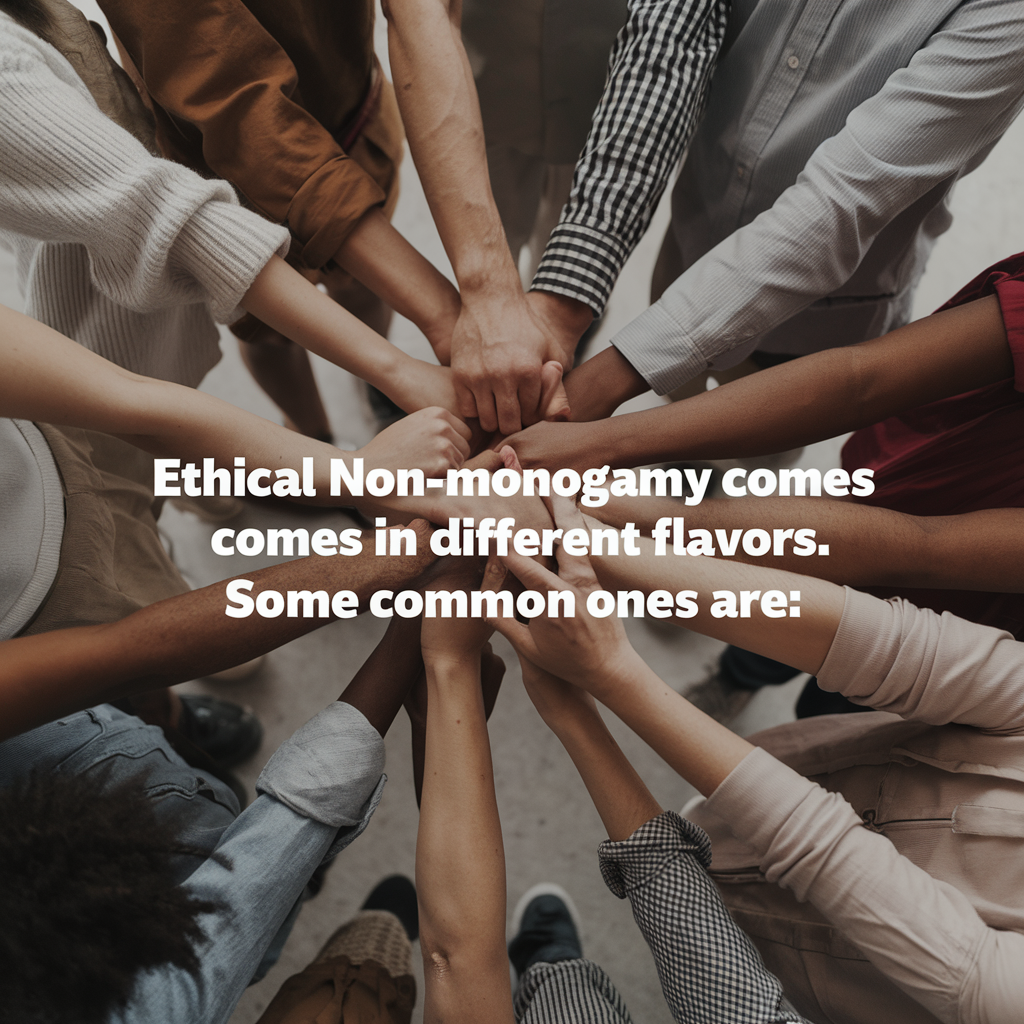
Key points
- Ethical non-monogamy means consensual non-exclusivity in relationships like romantic ones. Partners agree to have several love or sexual partners.
- However, each participant’s open conversation, honesty, and respect are what it requires. Don’t dismiss your partner(s) by cheating or backstabbing.
- It’s important to set limits and stay true to your word. Partner talks about what each are comfortable with and respects that. Transparency are essential for trust.
Contents
- 1 Key points
- 2 What is Ethical Non-Monogamy?
- 3 Definition and Overview of Ethical Non-Monogamy
- 4 Historical Context and Evolution
- 5 Different Cultural Views on Open Relationships
- 6 Principles of Ethical Non-Monogamy
- 7 Styles of Ethical Non-Monogamy
- 8 Issues In Ethical Non-Monogamy.
- 9 Building a Supportive Community.
- 10 Frequently Asked Questions (FAQ)
What is Ethical Non-Monogamy?
Having more than one partner is non-monogamy. Ethical non-monogamy means that people have different partners without hiding stuff. Paraphrase this: The partners all know about each other and agree to the arrangement. It’s different than cheating, where someone is dishonest and has other partners, but doesn’t tell their other partner.
Definition and Overview of Ethical Non-Monogamy

Ethical non-monogamy comes in different flavors. Some common ones are:
- Open relationships – A couple agrees they can sleep or date other people outside the relationship.
- Polyamory – Can be in love with multiple partners at the same time.
- Swinging – Partners get exchanged for sexual play.
All of these have honesty as their main thing. Everyone is aware and goes along with it. Some ground rules and boundaries are also there usually.
Historical Context and Evolution

Non-monogamy has always been a part of society. The contemporary ethical non-monogamy movement began in the 1960s and 1970s. Books and magazines began talking about open relationships. One example is Loving More.
Since the 1990s, people started becoming polyamorous / non-monogamous online on the internet. It enabled them to discover information and form communities. New blogs, forums, and dating sites appeared.
These days, many people accept non-monogamous relationships. There are celebrities and famous people who are ready to date.
Different Cultural Views on Open Relationships
Views on non-monogamy are different around the world. Some cultures such as Amazon tribes or Indian tribes allowed people to have multiple partners. However, many cultures are monogamous.
In the USA, society views stuff like polygamy as ‘bad’. But opinions change slowly and mostly with the youth. However, polyamorous families have few legal rights.
Non-monogamy experiences social stigma even when it legal. People in open non-monogamous relationships may face discrimination.
Principles of Ethical Non-Monogamy
The most important thing partners must be on the same page. Everyone’s gotta know what’s up and be cool with it. Don’t Steal or cheat. We all need to remain open and honest with one another. And respect the boundaries and limits of people.
Consent and Communication
Always check for consent from everyone involved. Continuously check to see that people still feel good about things. Make sure you discuss everything so that nothing is left unclear. Even small things can matter so do no guess.
Honesty and Transparency
Be open and honest with partners. If you make a mistake, confess it quickly. Own your feelings when jealousy or another comes up. Everything about it can only work if everyone is genuine about what’s going on with them.
Respect and Boundaries.
Respect those things that make individuals feel safe and comfortable. Move at the speed that suits everyone and not just you. Respect the boundary set by someone Talk before you hook up.This is basic but very important.
Styles of Ethical Non-Monogamy
There are numerous ways in which people can engage in open relationships in a healthy and ethical manner. It should not involve any cheating or hurtful actions. Here are the important styles that people do it.
Open Relationships
An open relationship is when a couple decides it’s alright to hook up with other people for fun and pleasure. They set ground rules like use protection always. They keep on talkin’ so that nobody gets too jealous.
Polyamory
Polyamory describes a situation when two or more people from the family love each other. They could have a wife and also a girlfriend. As long as everyone knows about it and agrees to it, it can work out very well.
Swinging
Swinging is a sexual act of married couples exchanging partners. They don’t get emotional, they just do it. They may go to parties where they swap partners for one night.
Relationship Anarchy
Relationship anarchy does not follow any of the traditional rules of relationships. People just connect in what ever way they feel like, without the labels of boyfriend or girlfriend. You aren’t charged for anything.
Issues In Ethical Non-Monogamy.
Making a relationship open requires work. When you or your partner start dating other people, a lot of jealousy and insecurity creeps in. Talk about your boundaries, and be honest if something makes you feel uncomfortable. Don’t Allow Jealousy to Ruin the Good.
Jealousy and Insecurity
Sometimes feeling jealousy, even with complete buy-in to non-monogamy, is a totally normal feeling. Understanding the cause of these feelings takes time. Understand the source of your insecurities. Patience is key! Talk it over with your partner(s). Over time, jealousy fades.
Time Management
When you have multiple partners, it can get tricky scheduling. Be sure to set quality time aside for every relationship. Don’t let anybody feel lonely. If you are getting overwhelmed, don’t hesitate to scale it down and manage the people who matter.
Social Stigma and Misunderstanding
Not everyone will understand your choices. Some might pass judgment and assume. Try to educate and inform without becoming defensive. Have friends who are open-minded and supportive. Don’t let others make you doubt your arrangements with your partners.
Building a Supportive Community.
It’s very important to find people who understand you. When you connect with open-minded people who don’t judge you for being yourself, it helps lessen your isolation. Try contacting community groups for local support and new online friends. When you have a helpful crew by your side, it opens your mind up to the other side.
Finding Like-Minded Individuals.
It may be frightening to go out there at first. However, it is definitely worthwhile to find people with similar interests. Check out polyamory meet-ups or sex-positive events in your area. Become a member of E.N.M. forums or social media. Meeting people in real life having the same outlook as you towards relationships can be liberating.
Creating Safe Spaces.
It’s so important to have spaces where you feel you can just be yourself. It could also be an online chat or a regular in-person grouping. Set some rules to keep things respectful. It’s important that your community is inclusive and welcoming of all people.
Resources and Support Networks.
It is useful to know that you are not alone. Get In Touch With Counsellors Or Coaches For Non-Monogamy
Seek out poly people communities that understand the lifestyle. When you have good resources, you can work things out and get your needs met.
Frequently Asked Questions (FAQ)
What's the difference between polygamy and ethical non-monogamy?
Polygamy specifically refers to being married to multiple partners at the same time. Ethical non-monogamy is an umbrella category that includes various types of consensual non-monogamous relationships, including polygamy but also relationships without marriage, such as polyamory.
Can ethical non-monogamy work long term?
Yes, ethical non-monogamy can absolutely work long term when practiced with open communication, clearly defined boundaries, and mutual respect between all partners.
Is ethical non-monogamy just an excuse to cheat?
No. The key difference is that ethical non-monogamy involves honesty and consent from all involved parties, while cheating involves deception and breaking agreements.
What are some ground rules for making ENM work?
Some key ground rules are practicing open and frequent communication, honoring each other’s boundaries, scheduling quality time, and dealing with issues like jealousy through compassion and understanding rather than judgment.
Can monogamous and non-monogamous people date each other?
It’s possible, but it requires both partners being willing to communicate clearly and compromise. Fundamental differences in needs and values around monogamy may be difficult to overcome long-term.
Is non-monogamy more common among men or women?
Research shows ethical non-monogamy is practiced in near equal rates by men and women. Reasons for seeking it differ between genders, but both participate mutually.
How do you manage time between multiple partners?
Through open communication, clear scheduling, and consistently making quality time for each relationship. Some tips are planning ahead, being flexible, and not overcommitting yourself.
Can you be happily non-monogamous without your family's approval?
Yes, you can be happily non-monogamous without approval from family members, though their support can be very helpful. The most important approval comes from within your relationships.
Is consensual non-monogamy legal everywhere?
Yes, ethical consensual non-monogamy is legal in most places. A few exceptions are laws against adultery, bigamy, or sodomy that remain on the books in some areas.
What are the main pros and cons of ENM compared to monogamy?
Pros are more freedom, varied connections, novelty. Cons are more complexity, time/emotional management, stigma. There are merits to both relationship structures.

I am a free-spirited author with the focus of relationships, travel, mental health, and womanhood. I am still new to the writer scene but am excited for the journey that awaits.